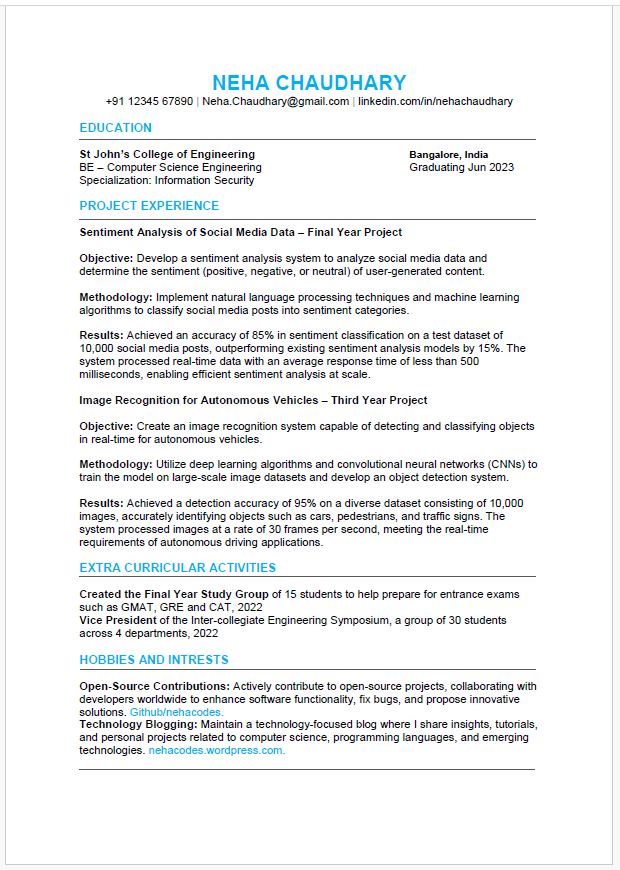Information Security Related Job Roles
BE – Computer Science Engineering

About this template
This is a very simple and professional resume which can effectively highlight your skills and experiences in a clear and concise manner.
This template is made in MS Word so, users can easily customize it to fit their specific needs.
Some most common BE – Computer Science, Information Security Related Job Roles
After completing a Bachelor of Engineering (BE) in Computer Science with a focus on Information Security, graduates can pursue various specialized job roles. Here are some of the most common ones:
1. Information Security Analyst:
Information Security Analysts protect an organization’s information systems from cyber threats. They implement security measures, monitor networks for security breaches, and conduct vulnerability assessments. Proficiency in threat detection tools and cybersecurity protocols is essential for this role.
2. Cybersecurity Engineer:
Cybersecurity Engineers design and implement secure network solutions to defend against hackers, cyber-attacks, and other persistent threats. Skills in firewall management, intrusion detection systems, and encryption technologies are crucial for ensuring data security.
3. Security Consultant:
Security Consultants assess an organization’s security posture and recommend improvements. They perform risk assessments, develop security policies, and guide companies on best practices. Strong analytical skills and knowledge of security frameworks like ISO 27001 are vital.
4. Penetration Tester (Ethical Hacker):
Penetration Testers simulate cyber-attacks on systems to identify vulnerabilities. They use a variety of tools and techniques to exploit security weaknesses and report findings. Proficiency in ethical hacking, scripting, and knowledge of security tools like Metasploit is necessary.
5. Network Security Engineer:
Network Security Engineers focus on protecting an organization’s network infrastructure. They configure firewalls, VPNs, and other security appliances to safeguard data. Understanding of network protocols and hands-on experience with security hardware are key skills.
6. Security Architect:
Security Architects design robust security architectures for IT systems. They establish security standards, evaluate new security technologies, and ensure that systems are built with security in mind. Deep knowledge of system architecture and security best practices is essential.
7. Incident Response Specialist:
Incident Response Specialists are the first line of defense when a security breach occurs. They investigate and contain security incidents, analyze root causes, and implement measures to prevent future breaches. Quick decision-making and expertise in forensics are critical skills.
8. Forensic Computer Analyst:
Forensic Computer Analysts investigate cybercrimes by collecting and analyzing digital evidence. They work closely with law enforcement to uncover how attacks occurred and gather evidence for prosecution. Skills in digital forensics tools and legal knowledge are important.
9. Compliance and Risk Analyst:
Compliance and Risk Analysts ensure that an organization adheres to regulatory requirements and industry standards. They evaluate risks related to information security and develop strategies to mitigate them. Familiarity with compliance regulations like GDPR or HIPAA is essential.
10. Security Software Developer:
Security Software Developers create software solutions that focus on securing applications and systems. They design and code security features, conduct security testing, and fix vulnerabilities. Strong programming skills and an understanding of secure coding practices are vital.
Conclusion:
These job roles are tailored to the specialized skills required in the field of Information Security, providing diverse opportunities for BE graduates to apply their technical knowledge in protecting digital assets and ensuring cybersecurity.